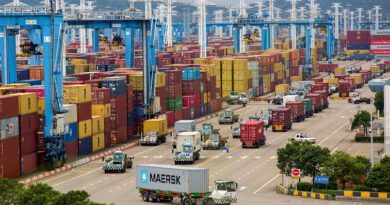Government scraps plan to use fuel levy instead of e-tolls to pay for GFIP
The government has scrapped a plan to use the fuel levy instead of e-tolls to pay for the Gauteng Freeway Improvement Project (GFIP) due to the recent sharp increase in fuel prices.
Transport Minister Fikile Mbalula confirmed this on Thursday, adding that a final decision on the future of e-tolls will be announced when Finance Minister Enoch Godongwana delivers the Medium-Term Budget Policy Statement (MTBPS) in October or before then.
Mbalula admitted that he has made a lot of promises about a government decision on e-tolls – the last one when Tito Mboweni was still finance minister – but said: “This one is for sure, certain.”
“We have agreed last week, so our teams are working on the issues that need to be worked on before we make a final decision.
“There was a decision that was taken by Cabinet on e-tolls, which was taking us in the direction of the fuel levy. The fuel levy story has become very messy over time and it’s no longer an option we can consider, among others.”
Mbalula said the fuel price has increased, with the conflict between Russia and Ukraine just exacerbating the situation in South Africa.
Read:
What’s driving the surge in SA’s fuel price?
Fuel retailers rebuked for raising fuel levy and tax issues
Temporary fuel levy relief will be withdrawn from August
The fuel price, among other factors, affected the government’s decision on using the fuel levy “to do away with [e-tolls on] GFIP”.
“So we are not taking that route. We are looking at various options in terms of e-tolls, which we will finalise before the MTBPS. That is where we are with the e-tolls,” he said.
Missed opportunity, says Outa
Organisation Undoing Tax Abuse (Outa) CEO Wayne Duvenage said Outa proposed in 2012 that the government use the fuel levy to fund GFIP through a 10 cent increase in the fuel levy.
Duvenage said had government done that, it would have paid off the capital costs and most of the interest by now and most of the bonds would also be paid off.
He added that there are ways for government to find the money to pay for GFIP and referred to the Department of Sports and Culture’s R22 million flag project, which was subsequently abandoned.
Duvenage said the government should go on a belt-tightening spree of all departments to find the savings for the country.
He said there have been above-inflation increases in the fuel levy for many years and government has been allocating funds to the SA National Roads Agency (Sanral) to service its GFIP bonds, and should continue to do so.
Perspective
Duvenage said government cannot lean on the taxpayer any more and must stop continuously increasing taxes and instead fix the problems.
He said what frustrates Outa is reading the Auditor-General’s report and seeing that there were 13 municipalities which had disclaimers against them last year, yet those same municipalities got government grants from Treasury.
Read: ‘No improvement’ in municipal management in 2021: Auditor-General
“If a municipality has a disclaimer, you don’t give them grants. I know the poorest of the poor feel that but you give the grant, the money, to where it should go.
“You take the municipality out of it and give it to an entity to make sure the municipality doesn’t get its hands on that money.
“Treasury has massive oversight powers but is not exercising them,” he said.
Duvenage said Port Elizabeth’s infrastructure bypass around the city was recently upgraded beautifully and there have been upgrades even in Durban in Umhlanga in the North Coast area with beautiful flyovers, but none of these roads are tolled.
“Now the N3 between [Pietermaritzburg] and Durban is being upgraded but is not going to be tolled as far as we know.
“People say why should we pay for Johannesburg’s roads [via a national fuel levy], which begs the question who is paying for ‘those’ roads?
“Why should we pay for our roads and you guys can get your upgrades and freeways? That is the nonsense,” he said.
AA’s suggestion
Automobile Association (AA) spokesperson Layton Beard said the AA has suggested that a portion of the fuel levy be used to fund GFIP and all similar projects throughout the country.
Beard said there is this notion that government cannot ring-fence the fuel levy, but the AA believes it would be easy to do.
He stressed the AA is suggesting ring-fencing a portion of the fuel levy, not increasing the fuel levy.
Beard added that questions also need to be asked about where money is being appropriated by government and whether it is being allocated properly across the needs of government.
“This issue of appropriation and allocation of funds comes back to this whole issue of graft and corruption,” he said.
“Unless you deal with one, you can’t deal with the other. You have to deal with both of them equally at the same time.”
Source: moneyweb.co.za



